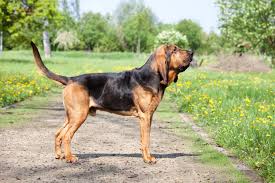
Bloodhound
Conditions of detention
Bloodhounds thrive in environments where they have plenty of space to roam and exercise. They are best suited for homes with large yards or access to open areas, ideally in suburban or rural settings.
Useful Fact: Due to their strong scent-tracking instincts, they need secure, fenced areas to prevent them from wandering off in pursuit of an interesting scent.
Nutrition and diet
A balanced diet rich in protein and fats is essential for Bloodhounds. High-quality commercial dog food, supplemented with fresh meat and vegetables, supports their active lifestyle and physical health.
Useful Fact: Monitoring their food intake and ensuring they receive proper nutrition is important to maintain a healthy weight and prevent obesity.
Health
Bloodhounds are generally healthy dogs but can be prone to certain health issues such as hip dysplasia, elbow dysplasia, bloat, and ear infections. Regular veterinary check-ups and maintaining a healthy diet are crucial.
Useful Fact: Regular ear cleaning is essential to prevent ear infections, as their long, drooping ears can trap moisture and debris.
Grooming and care
The Bloodhound has a short, dense coat that requires minimal grooming. Regular brushing helps remove loose hair and keep their coat healthy. Bathing should be done as needed.
Useful Fact: Despite their short coat, Bloodhounds shed year-round, so regular brushing helps manage shedding and maintain their coat’s appearance.
Education and training
Bloodhounds are intelligent but can be independent and stubborn, making training a challenge. Early socialization and consistent, positive reinforcement training methods are crucial.
Useful Fact: They excel in scent-based training activities and games, which cater to their natural hunting instincts and keep them engaged.
Toys and entertainment
Interactive toys, puzzle games, and activities that involve tracking and retrieving are excellent for keeping a Bloodhound mentally and physically stimulated.
Useful Fact: Engaging them in scent-based games and exercises helps satisfy their natural tracking instincts and keeps them happy.
Safety
A secure, fenced yard is important for Bloodhounds to prevent them from wandering off while following scents. Supervision during outdoor activities is recommended.
Useful Fact: Their strong sense of smell can lead them to chase after scents, so keeping them on a leash during walks is essential for their safety.
Accessories
Sturdy collars and leashes, comfortable bedding, grooming tools, and interactive toys are essential accessories for a Bloodhound. Crate training can also be beneficial for travel and safety.
Useful Fact: Reflective gear enhances safety during evening or early morning walks, making them more visible to others.
Socialization
Early and ongoing socialization with other dogs, animals, and people is important for Bloodhounds. It helps them develop a well-rounded temperament.
Useful Fact: Regular socialization helps prevent shyness or aggression and ensures they are friendly and adaptable in various situations.
Travel and Transportation
Bloodhounds can adapt to travel if introduced gradually. Secure crates or harnesses in vehicles ensure their safety during trips.
Useful Fact: Bringing familiar items, such as their favorite blanket or toy, can help reduce travel anxiety and make them more comfortable
Behavior and psychology
Bloodhounds are known for their intelligence, loyalty, and strong work ethic. They require regular mental and physical stimulation to prevent boredom and destructive behavior.
Useful Fact: Their close bond with their family makes them excellent companions, but they can exhibit some independence due to their hunting background.
Legal aspects
Owners should be aware of local regulations regarding pet ownership, including licensing, leash laws, and specific breed regulations.
Useful Fact: Keeping vaccination records and adhering to local pet laws ensures the safety and legality of owning a Bloodhound.


